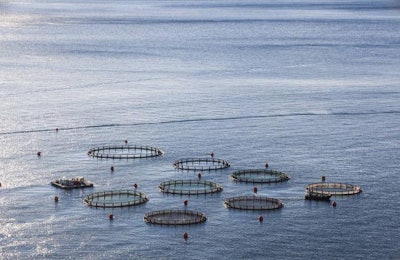
‘We need alternatives as soon as possible’ to prevent shortage of omega-3, researcher says
Aquaculture could face an even greater shortage of omega-3 fatty acids in the future as global oceans continue to warm, according to the authors of a recent paper.
Global production of seafood is already stymied by finite supplies of fishmeal and fish oil, key ingredients in aquafeed and other animal diets. A new paper from the journal Ambio, a publication of the Royal Swedish Academy of Sciences, suggests climate change could result in even tighter markets for fishmeal and reduce natural supplies of omega-3 fatty acids by 10-58% by 2100.
The study’s authors first noticed a correlation between water temperature and omega-3 production in algae in previous research, which led to the realization that increased ocean temperatures would decrease the production of omega-3 in wild fisheries — and in the forage fish from which the majority of the world’s fishmeal and fish oil is obtained. In their latest paper, the researchers used aquaculture production data from the Food and Agriculture Organization to model the resulting availability of omega-3 throughout the food chain if warming continues.
Shortages of omega-3 in natural fisheries could further increase demand for aquaculture, which is already growing rapidly. At the same time, the industry would have to use ever-increasing amounts of fishmeal to achieve the same nutritional value as in the past, according to Stefanie Columbo, the study’s lead author and an assistant professor of aquaculture nutrition at Dalhousie University. This could result in a feedback loop that, in a worst-case scenario modeled for the journal Ambio, could result in a shortage of omega-3 in 96% of the human population.
“It adds to the issue that we’re going to have in the future,” Columbo said. “If we don’t increase aquaculture production, there will be a big mismatch in supply and demand for seafood. That adds to a bigger issue that we’re going to be faced with, which is food security.”
Need for alternatives
But aquaculture could also break the cycle and prevent global omega-3 deficiency if the industry can find an alternative source outside fishmeal and fish oil, Columbo said.
“We need alternatives as soon as possible,” she said. “There is demand for seafood, and the industry cannot meet that demand without an alternative.”
The development of a viable commercial alternative “10years ago would have been good,” Columbo said. “The need for it is now.”
Columbo said there is also a need for additional research on how climate change will affect the availability of essential nutrients with respect to animal and human welfare. While rising temperatures appear likely to reduce the natural production of omega-3 fatty acids, Columbo said it’s not yet clear how those temperatures will impact the ability of finfish to metabolize nutrients. Warm waters might decrease consumption of omega-3; or they might accelerate the metabolism, increasing demand for fatty acids.
“I think, for aquaculture, there is a lot of potential to supply the world” with essential nutrients, Columbo said, “but there are a lot of unknowns right now.”









